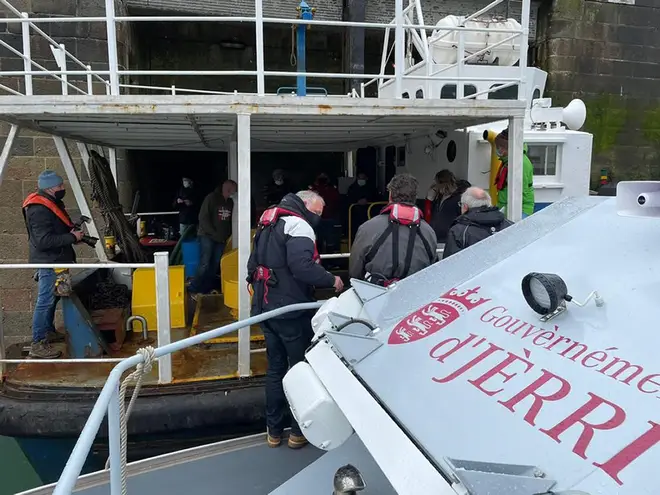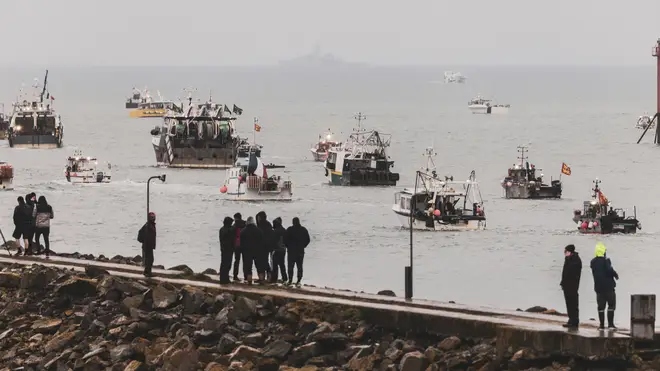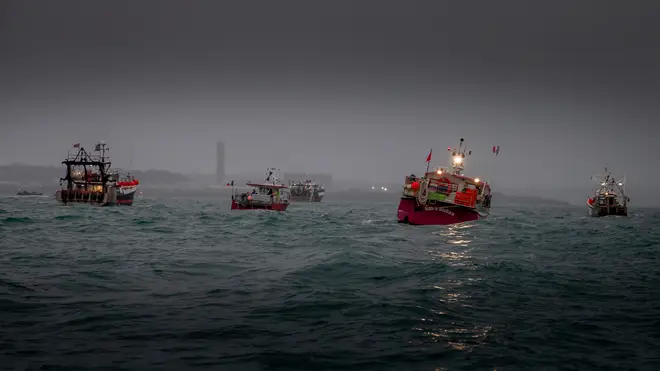
Matt Frei 10am - 1pm
6 May 2021, 20:57 | Updated: 6 May 2021, 21:07

Top officials from the Jersey government have held talks with French fishermen amid an escalating dispute over post-Brexit fishing rights.
The 90-minute meeting held on two boats off the coast of the island on Thursday afternoon - where around 60 French vessels were protesting against new rules which require them to prove they can work in Jersey waters.
The row escalated today when a French government minister suggested Jersey's power supply - 95% of which comes from France - could be cut off if the dispute is not resolved soon.
READ MORE: French fishermen halt protest off Jersey over post-Brexit fishing rights
A pair of Royal Navy patrol ships, now preparing to stand down, were scrambled to "monitor the situation" after hearing about the demonstration, prompting France to deploy its own patrol boats while British and French trawlers faced off along the coast.
Assistant Minister for the Environment Deputy Gregory Guida joined representatives from the protest group, which resulted in them leaving the island later in the day "knowing that they had been listened to".

Following the meeting, Chief Minister Senator John Le Fondré said: “The French fishermen protested peacefully and respectfully, and were able to set out their concerns directly to Government representatives.
“We recognise that there have been challenges in the implementation of the new trade agreement.
"Speaking directly to the fishermen has enabled both parties to better understand how those challenges will be addressed, and we are proposing the establishment of a forum which will enable the Government of Jersey to continue to engage with all fishermen in the region openly and constructively.
WATCH: French trawler rams UK boat as Jersey fishing stand-off escalates
"I’d like to thank Deputy Guida and all the other parties whose work has enabled the French fishermen to leave Jersey knowing that they had been listened to, and that a step has been taken towards resolving the issues that have arisen during the move to the new trade agreement."
European disputes over fishing rights is a decades-old battle but the latest row began when the Jersey government announced French fishermen be required to obtain licences to carry on fishing in the island's waters under a trade deal with the EU which came into force last Friday.
Under the rules, they would have to prove they had trawled in the waters before - but almost half the group of fisherman needing to complete the paperwork have not submitted any documents, meaning they would be blocked from taking fish from Jersey's surrounding waters.

In an interview with LBC on Thursday, Jersey's External Relations Minister Ian Gorst said he "absolutely knew" post-Brexit arrangements would cause difficulties between the island and France.
"Our fishermen have been finding it very difficult to land in France," he said, "something that they've been doing unhindered for hundreds of years."
"We also knew that transitioning from an agreement that we had with France - which is called the Bay of Granville agreement and has been in place for over twenty years - to the new agreement which was negotiated would be difficult.
"That's why we need to talk through these difficulties and find solutions to them. The answer to the problems that we've faced over the last few days is diplomacy."

Jersey's External Relations Minister on post-Brexit 'difficulties'
The EU has complained to the UK that the terms of its post-Brexit trade deal are being ignored and insist French fishing boats facing "additional conditions" is a breach of the terms of the agreement.
But on Thursday Prime Minister Boris Johnson fully backed Jersey officials and called for "the urgent need for a de-escalation in tensions and for dialogue" between the two countries.
"The Prime Minister underlined his unwavering support for Jersey," a Downing Street spokesperson said.
READ MORE: Jersey minister tells LBC about post-Brexit 'difficulties'
"He said that any blockade would be completely unjustified. As a precautionary measure, the UK will be sending two offshore patrol vessels to monitor the situation."
It is the latest dispute between the UK, its Crown Dependancies and the European Union over the Brexit agreement, with tensions over the Northern Ireland Protocol sparking protests at the border and at ports and threats of legal action after the British government unilaterally extended grace periods for border checks and rules changes around things such as supermarket supplies and parcel deliveries between Great Britain and NI.